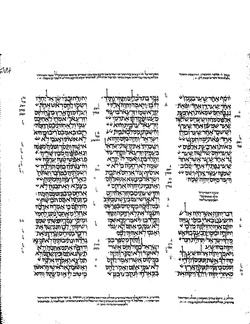The Book of Zephaniah /ˌzɛfəˈnaɪ.ə/ (Hebrew: צְפַנְיָה, Ṣəfanyā; sometimes Latinized as Sophonias) is the ninth of the Twelve Minor Prophets of the Old Testament and Tanakh, preceded by the Book of Habakkuk and followed by the Book of Haggai. Zephaniah means "Yahweh has hidden/protected,"[1] or "Yahweh hides".[2] Zephaniah is also a male given name. The original text was written in Biblical Hebrew.

The book's superscription attributes its authorship to "Zephaniah son of Cushi son of Gedaliah son of Amariah son of Hezekiah, in the days of King Josiah son of Amon of Judah,"[3] All that is known of Zephaniah comes from the text.[1]
The name "Cushi," Zephaniah's father, means "Cushite" or "Ethiopian," and the text of Zephaniah mentions the sin and restoration of Cushim.[4] While some have concluded from this that Zephaniah was dark-skinned or African,[2] Ehud Ben Zvi maintains that, based on the context, "Cushi" must be understood as a personal name rather than an indicator of nationality.[5] Abraham ibn Ezra interpreted the name Hezekiah in the superscription as King Hezekiah of Judah, though that is not a claim advanced in the text of Zephaniah.[5]
As with many of the other prophets,[6] there is no external evidence to directly associate composition of the book with a prophet by the name of Zephaniah.[1] Some scholars, such as Kent Harold Richards and Jason DeRouchie, consider the words in Zephaniah to reflect a time early in the reign of King Josiah (640–609 BC) before his reforms of 622 BC took full effect,[7][2] in which case the prophet may have been born during the reign of Manasseh[7] (698/687–642 BC).[8] Others agree that some portion of the book is postmonarchic,[9] that is, dating to later than 586 BC when the Kingdom of Judah fell in the Siege of Jerusalem.[8] Some who consider the book to have largely been written by a historical Zephaniah have suggested that he may have been a disciple of Isaiah because of the two books' similar focus on rampant corruption and injustice in Judah.[7]
If Zephaniah was largely composed during the monarchic period, then its composition was occasioned by Judah's refusal to obey its covenant obligations toward Yahweh despite having seen Israel's exile a generation or two previously[1]—an exile that the Judahite literary tradition attributed to Yahweh's anger against Israel's disobedience to his covenant.[10][11] In this historical context, Zephaniah urges Judah to obedience to Yahweh, saying that "perhaps" he will forgive them if they do.[12][1]
The HarperCollins Study Bible supplies headings for the book as follows:[13]
| Verse (NRSV) | Heading |
|---|---|
| 1:1 | (Superscription) |
| 1:2–13 | The Coming Judgment on Judah |
| 1:14–18 | The Great Day of the Lord |
| 2:1–15 | Judgment on Israel's Enemies |
| 3:1–7 | The Wickedness of Jerusalem |
| 3:8–13 | Punishment and Conversion of the Nations |
| 3:14–20 | Song of Joy |
More consistently than any other prophetic book, Zephaniah focuses on "the day of the Lord,"[1] developing this tradition from its first appearance in Amos.[14][15][16] The day of the Lord tradition also appears in Isaiah, Ezekiel, Obadiah, Joel, and Malachi.[17][18]
The book begins by describing Yahweh's judgement. With a triple repetition of "I will sweep away" in 1:2–3, Zephaniah emphasizes the totality of the destruction,[19] as the number three often signifies perfection in the Bible.[20] The order of creatures in Zephanaiah 1:2 ("humans and animals ... the birds ... the fish") is the opposite of the creation order in Genesis 1:1–28, signifying an undoing of creation.[21] This is also signified by the way that "from the face of the earth" forms an inclusio around Zephaniah 1:2-3, hearkening back to how the phrase is used in the Genesis flood narrative in Genesis 6:7, Genesis 7:4, and Genesis 8:8,[19] where it also connotes an undoing of creation.[22]
As is common in prophetic literature in the Bible, a "remnant" survives Yahweh's judgement in Zephaniah[23] by humbly seeking refuge in Yahweh.[24][25] The book concludes in an announcement of hope and joy,[26][27] as Yahweh "bursts forth in joyful divine celebration"[28] over his people.[29]
Because of its hopeful tone of the gathering and restoration of exiles, Zephaniah 3:20 has been included in Jewish liturgy.[26]
Zephaniah served as a major inspiration for the medieval Catholic hymn "Dies Irae," whose title and opening words are from the Vulgate translation of Zephaniah 1:15–16.[14]
The original manuscript of this book has been lost. Some early manuscripts containing the text of this book in Hebrew are of the Masoretic Text tradition, which includes the Codex Cairensis (895), the Petersburg Codex of the Prophets (916), Aleppo Codex (10th century), Codex Leningradensis (1008).[30] Fragments containing parts of this book in Hebrew were found among the Dead Sea Scrolls, including 4Q77 (4QXIIb; 150–125 BCE),[31][32][33] 4Q78 (4QXIIc; 75–50 BCE),[32][33][34] and Wadi Murabba'at Minor Prophets (Mur88; MurXIIProph; 75-100 CE).[32][35]
There is also a translation into Koine Greek known as the Septuagint, made in the last few centuries BC. Extant ancient manuscripts of the Septuagint version include Codex Vaticanus (4th century), Codex Sinaiticus (4th century), Codex Alexandrinus (5th century) and Codex Marchalianus (6th century).[36] Some fragments containing parts of the Septuagint version of this book were found among the Dead Sea Scrolls, i.e., Naḥal Ḥever (1st century CE).[32][37]
Book of Zephaniah | ||
| Preceded by | Hebrew Bible | Succeeded by |
| Christian Old Testament | ||